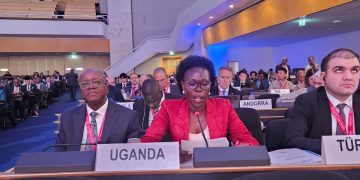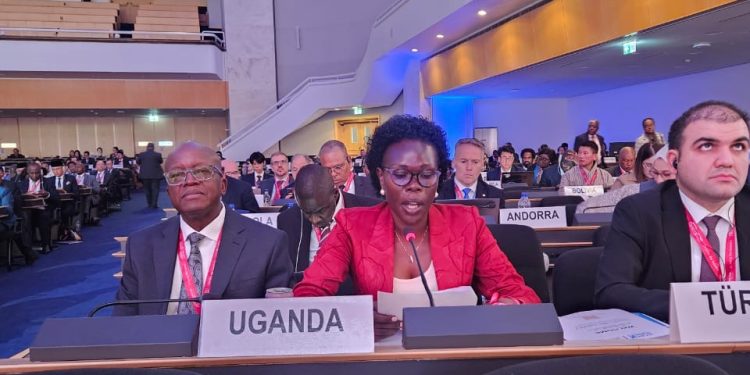GENEVA — The 16th United Nations Conference on Trade and Development (UNCTAD16), under the theme “Shaping the Future: Driving Economic Transformation for Equitable, Inclusive and Sustainable Development,” concluded in Geneva, Switzerland, after four days of deliberations from October 20th to 23rd, 2025.
During the conference, which brought together ministers, senior policymakers, and development partners to discuss leveraging trade, investment, and technology for inclusive growth, Uganda reaffirmed its commitment to multilateralism and inclusive global growth.
Hosted by the Government of Switzerland, the conference was officially opened by UNCTAD Secretary-General Rebeca Grynspan, who called for a renewed spirit of cooperation and trust in the multilateral trading system.
“We’ve come here to shape the future — together — so that trade, investment, and technology work for people, not the other way around,” said Grynspan. “The world needs a new model of development that harnesses innovation and digitalisation to bridge divides rather than deepen them.”
She underscored that global economic transformation must prioritise fairness and sustainability, ensuring that no country or community is left behind in the pursuit of progress.
Multilateralism and Inclusive Growth
Uganda was represented at the conference by Hon. Evelyn Anite, Minister of State for Privatisation and Investment, who delivered the country’s national statement during the high-level segment on behalf of the Ministry of Finance, Planning and Economic Development (MoFPED).
In her address, Hon. Anite reaffirmed Uganda’s steadfast commitment to multilateralism, solidarity, and inclusive global growth, emphasising that developing nations must stand together to shape their shared economic destiny.
“Cooperation among developing nations is not optional, but essential,” Hon. Anite said during the G77 and China Ministerial Meeting. “Only through unity can we address the inequalities and vulnerabilities that continue to hinder our collective progress.”
She noted that Uganda’s development vision aligns with the global call for equitable and sustainable transformation — a vision rooted in industrialisation, digital innovation, and regional integration.
Support for Countries Graduating from LDC Status
A central focus of Uganda’s message at UNCTAD16 was the need for targeted support to countries transitioning out of the Least Developed Country (LDC) category. Uganda met the UN’s graduation criteria in 2024, marking a major milestone in its development trajectory.
“Countries at the threshold of graduation need tailored support to preserve the gains achieved and ensure that the transition is both smooth and irreversible,” Hon. Anite stated during the LDCs Ministerial Meeting. “We therefore urge UNCTAD and our partners to deepen engagement with graduating countries through a robust Graduation Support Programme.”
She emphasised that graduation should not result in the loss of vital international support measures such as trade preferences, concessional financing, and technical assistance, which are crucial for sustaining development momentum.
“Graduation should be a springboard for continued progress — not a setback,” she said. “We need international solidarity to ensure that the transition reinforces our economic resilience and strengthens our integration into the global economy.”
A Call for Renewed Global Solidarity
In her closing remarks, Hon. Anite appealed to all UNCTAD member states to embrace the conference as a turning point for collective action and renewed global purpose. “Let UNCTAD16 be remembered as the moment that reaffirmed solidarity, revitalised multilateral cooperation, and charted a path toward a fairer and more sustainable global economy,” she said.
She highlighted Uganda’s commitment to working with other developing countries to promote fair trade, responsible investment, and sustainable industrialisation — principles at the heart of the 2030 Agenda for Sustainable Development and Agenda 2063: The Africa We Want.
Building Consensus for a Fairer Global Economy
Since September 2024, representatives from UNCTAD’s 195 member states have been negotiating the text to be adopted at UNCTAD16. The outcome document articulates a shared vision for addressing global economic challenges and sets UNCTAD’s strategic priorities for the next four years.
Ministerial meetings were also held for key regional and thematic groups, including the Group of 77 and China, the African Group, the Group of Least Developed Countries, and the Group of Landlocked Developing Countries. These forums enabled ministers — including Hon. Anite — to exchange views, forge common positions, and advocate for shared development priorities.
Each ministerial meeting concluded with the adoption of a Ministerial Declaration, which forms part of the official UNCTAD16 outcome package.
Uganda’s participation reaffirmed its active engagement in global economic diplomacy and its role as a champion for inclusive growth. The country’s delegation advocated for greater international cooperation to enhance investment in productive sectors, support digital transformation, and build resilience against global shocks such as climate change and supply chain disruptions.











